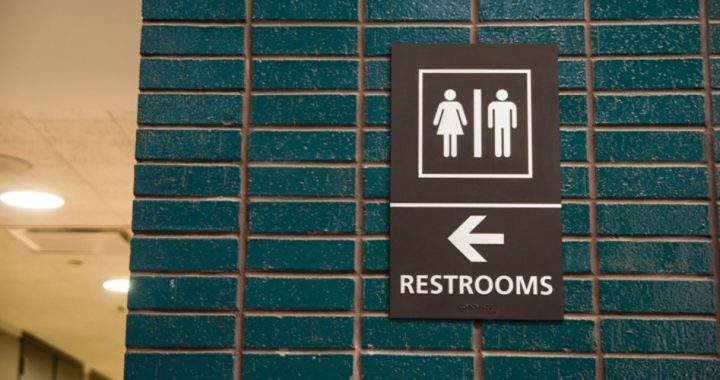
A Virginia transgender high-school student does not have the option of using the school restroom of his (or her) choice — at least not yet. On Wednesday, the Supreme Court blocked a lower court’s ruling that the student, a female who identifies as male, had the right under federal law as interpreted by the Obama administration to use the boys’ bathroom at Gloucester High School despite school policy to the contrary.
The court ruled 5-3 in favor of staying the Fourth Circuit Court of Appeals decision until such time as the Gloucester School District is able to file a formal appeal with the high court and the court considers that appeal. The male justices — John Roberts, Clarence Thomas, Anthony Kennedy, Samuel Alito, and Stephen Breyer — voted in favor of the stay, while the females — Ruth Bader Ginsburg, Elena Kagan, and Sonia Sotomayor — dissented.
Breyer, however, was careful to clarify that his vote did not mean he would necessarily side with the school district when the appeal comes up for consideration.
“In light of the facts that four justices have voted to grant the application referred to the court by the chief justice, that we are currently on recess and that granting the stay will preserve the status quo,” he wrote, “I vote to grant the application as a courtesy.”
The four-justice vote is significant because that is also what is needed for the court to hear an appeal. Breyer apparently felt that since the court’s choosing to hear the appeal is almost certainly a foregone conclusion, it would be best to keep things as they are rather than allow the student to begin using the boys’ restroom and then, perhaps, have that privilege revoked by an unfavorable decision.
The case began when 17-year-old Gavin Grimm — a girl who, suffering from “gender dysphoria,” has undergone hormone therapy to become more male-like and had her name legally changed — asked permission to use the boys’ bathroom at school. This request was in line with recent guidance from the Department of Education telling school districts that they must allow students to use restrooms and changing facilities “consistent with their gender identity” or face a loss of federal funding under Title IX of the Education Amendments of 1972, which prohibits schools from discriminating on the basis of sex.
According to the Wall Street Journal,
School officials initially allowed [Grimm] to use the boys’ restroom, but parents of other students complained to the school board. In December 2014, the board adopted a policy limiting use of restrooms and locker rooms “to the corresponding biological genders,” adding that “students with gender-identity issues shall be provided an alternative appropriate private facility.” The school installed single-stall unisex toilets that any student could use.
Grimm, as the student’s American Civil Liberties Union (ACLU) attorney put it, felt “isolated from his peers and stigmatized by the Gloucester County school board” and sued for the privilege of using the boys’ bathroom.
The Fourth Circuit, in a 2-1 decision, found that while the existing regulation under Title IX is unambiguous in declaring that discrimination on the basis of sex is forbidden, “it is silent as to how a school should determine whether a transgender individual is a male or female for the purpose of sex-segregated restrooms.” That, of course, is because 44 years ago no one had yet dreamed up the absurd notion that one’s sex is a matter of feelings rather than chromosomes, so neither Congress nor federal regulators felt the need to define “sex” or how to determine it.
In 2016, however, one’s sex is allegedly whatever he or she says it is, and no one is to dispute that. Thus, the court declared, “We conclude that the regulation is susceptible to more than one plausible reading because it permits both the Board’s reading — determining maleness or femaleness with reference exclusively to genitalia — and the [Education] Department’s interpretation — determining maleness or femaleness with deference to gender identity.” Therefore, the court deferred to the Obama administration’s interpretation and ordered the school board to allow to Grimm to use the boys’ bathroom.
Calling the ruling “one of the most extreme examples of judicial deference to an administrative agency this court will ever see,” the board asked the Supreme Court to grant an emergency stay of that decision while it prepares an appeal to file upon the court’s return from recess.
“Depriving parents of any say over whether their children should be exposed to members of the opposite biological sex, possibly in a state of full or complete undress in intimate settings, deprives them of their right to direct the education and upbringing of their children,” the board argued.
The court, as already noted, issued the stay.
The school board, naturally, welcomed the decision, saying it “continues to believe that its resolution of this complex matter fully considered the interests of all students and parents in the Gloucester County school system.”
Grimm’s attorneys, on the other hand, said they were “disappointed” in the ruling, claiming that the school board “has utterly failed to demonstrate that it will suffer irreparable harm” if the Fourth Circuit’s ruling were allowed to go into effect while it was being appealed.
How the Supreme Court will rule on the actual appeal is anybody’s guess. Assuming the late Justice Antonin Scalia’s seat remains open and the justices vote along ideological lines, the most probable result is an evenly split decision, which would reinstate the appeals court’s ruling and allow Grimm into the boys’ room.
Still, a judge who is sympathetic to Grimm’s cause but takes the Constitution and judicial precedent seriously would nevertheless be forced to vote to overturn the decision. From a constitutional standpoint, the federal government has no business dictating any policies for local schools, much less mandating that students be allowed to use bathrooms intended for the opposite sex. Moreover, as Case Western University law professor Jonathan Adler pointed out in a Washington Post opinion piece, “there was no basis for the 4th Circuit to defer to the [Education Department’s] interpretation” because, among other things, that interpretation was not issued as part of the formal regulatory process, which the department “has instead sought to sidestep … through letters and ‘guidance’ documents.”
Even if the Supreme Court overturns the circuit court’s decision, that is unlikely to be the end of the war over transgender privileges. Certainly the cultural Left isn’t going to give up after losing one small skirmish. Adler argued that the Education Department could easily make its preferred policy almost lawsuit-proof by promulgating it as an official regulation, something the Obama administration might well do after the presidential election. If not, a Hillary Clinton administration — if there is one — would probably have no qualms about doing so. And who knows what a Donald Trump administration would do? The situation is Grimm indeed.



